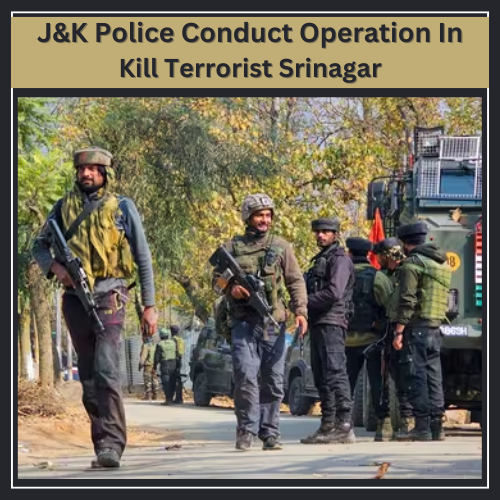Introduction
In a major security operation in Srinagar, Indian forces and the Jammu and Kashmir Police teamed up to eliminate a terrorist who had been actively involved in militant activities in the region. The operation, which took place in the Upper Dachigam forest area, was a well-coordinated response to intelligence reports that militants were hiding in the area. The joint operation, involving both the Army and local police, successfully resulted in the neutralization of one terrorist, with reports of a few others being trapped in the vicinity. The encounter has been seen as a significant victory in the ongoing battle against terrorism in Jammu and Kashmir.
This operation highlights the commitment of Indian security forces to ensuring the safety of citizens and maintaining law and order in the region. The area, known for its natural beauty and the presence of critical security operations, had been a hotspot for militants in the past. The precision and swiftness of this operation show the preparedness of the forces in responding to threats quickly and effectively. With such efforts, the region has seen an increase in successful counter-terrorism actions that continue to disrupt militant activities.

Details of the Operation
The operation in Srinagar was based on specific intelligence inputs that identified the presence of militants in the dense Upper Dachigam forest area, which is known for its challenging terrain. Once the intelligence was confirmed, the Indian Army and J&K Police launched a joint operation to neutralize the threat. The forces carried out a cordon and search operation (CASO), which led to a firefight between the security personnel and the militants. The exchange of gunfire lasted for several hours, and during the intense battle, one terrorist was killed. The forces are still working to identify the remaining militants trapped in the area.
This operation was part of a larger, ongoing effort to clear Jammu and Kashmir of terrorists who continue to operate in remote regions. The police and security forces worked meticulously to ensure the operation was carried out without any collateral damage to civilians in the area. It is important to note that Srinagar has seen an uptick in such operations recently, with authorities ensuring they remain vigilant and prepared for future threats. The success of this mission underscores the efficiency of joint security operations and their role in protecting public safety.
Background Information
Over the past few months, Jammu and Kashmir has been a focal point for various counter-insurgency operations. Despite security forces making notable strides, terrorists continue to pose a significant threat. The region has experienced a rise in gunfights between militants and security forces, particularly after incidents like the recent murder of two Village Defense Guards (VDGs) in the Kishtwar district. These continuous attacks have sparked an increased number of operations aimed at dismantling terrorist networks.
The Jammu and Kashmir Police, alongside Indian forces, have been proactive in gathering intelligence, conducting operations, and responding to emerging threats. With the state’s geography often making military action difficult, these operations demand high coordination, rapid decision-making, and significant risks. Fortunately, such operations have been successful in eliminating several top militant leaders, further dismantling the infrastructure of groups operating in the region. It’s not just about neutralizing threats but also sending a clear message to those who wish to destabilize the peace process in the area.
Impact of the Operation
The successful neutralization of the terrorist has had an immediate impact on the security landscape in Srinagar. While one militant has been eliminated, the operation has also managed to disrupt ongoing plots and activities being carried out by other militants. This is a major blow to the militant network in Jammu and Kashmir, as the neutralization of terrorists like these is pivotal in reducing overall terrorist activity in the region.
Additionally, such operations play a crucial role in boosting the morale of the security forces and local civilians alike. They demonstrate that the authorities are dedicated to curbing terrorist activities and ensuring the safety of everyday life. As the security situation stabilizes, citizens in Srinagar and surrounding areas can feel more confident that their safety is being prioritized. The operation also contributes to fostering trust in local law enforcement and the Indian Army, further solidifying their role in securing the region.
Challenges and the Road Ahead
Despite successes like this one, the situation in Jammu and Kashmir remains volatile. Terrorists continue to pose a significant threat, and their methods evolve to exploit gaps in security. The recent uptick in gunfights and terrorist attacks suggests that the region remains a hotbed for militancy, with groups constantly regrouping and attempting to re-establish control in key areas. The security forces, while effective, face immense challenges due to the difficult terrain and the involvement of multiple factions operating under different banners.
However, the road ahead is not without hope. The successful operations and the increasing coordination between local police, the Indian Army, and intelligence agencies provide a solid foundation for continued peace efforts. With sustained intelligence gathering, improved community cooperation, and strategic military action, the chances of defeating terrorism in the region are strong. The government and forces remain resolute in their commitment to ensure that peace prevails in Jammu and Kashmir, no matter how long the road may be.
Conclusion
The recent operation by Indian forces and the Jammu and Kashmir Police in Srinagar, which led to the death of a terrorist, highlights the ongoing battle against terrorism in the region. It demonstrates the effectiveness of joint operations and the determination of security forces to ensure safety and stability. While challenges remain, operations like these play a key role in weakening militant networks and ensuring that security forces maintain control over volatile areas. The actions taken by Indian forces reflect their commitment to protecting both the people of Jammu and Kashmir and the nation as a whole. The fight is far from over, but each successful operation moves the region closer to lasting peace.
